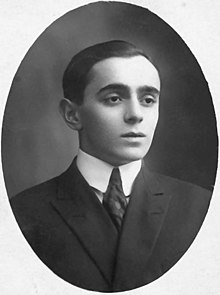Alexander Abramsky (Russian: Алекса́ндр Савва́тьевич Абра́мский; 22 January 1898 in Lutsk – 29 August 1985 in Moscow) was a Soviet composer.[1] He was known for his adaptation of folk music within his compositions.

Abramsky was born on January 10 (22), 1898 in the city of Lutsk. His father, Savvaty Vasilyevich (Shevel Volfovich) Abramsky (1859 -?), was a Jewish hospital doctor, and was married to Anna Fedorovna Burdo who had two sons, Mikhail and Alexander.[2] By all accounts, Abramsky's relationship with his father was warm and congenial.[2]
He became a teacher at the Union of Composers of the USSR in 1951, teaching compositional skills to young composers.[3]
Compositions
editOrchestral
edit- Three symphonies[2]
- Concerto for large symphony orchestra
Opera
edit- "The Vicious Circle" (based on the plot of A. Chekhov, libretto by Abramsky)
Musical
edit- “Lyali Khan and Anar Khan” (libretto by J. Asimov)
Songs
edit- "Who, Waves, Stopped You"? (Based on text A. Pushkin)[4]
Cantata
edit- “Breath of the Earth” (poems by V. Khlebnikov)
- “The stacks are burning” (poems by E. Verhaeren, translated by V. Bryusov)
- “Juno’s Lover” (poems by V. Khlebnikov)
Oratorio
edit- “Man Walks” (text by V. Kuznetsov and V. .Semernin)
- “Round Dances” (text by V. Kuznetsov and V. Semernin)
Instrumental
edit- “Five Compressed Messages” for strings and piano
Piano
edit- "Sonata laconique" (“Brief Sketch”)
- “Pasionaria” (“Pasionary”)
- "Spanish Rhapsody"
Writings
edit- 1936: "Opera On The Collective Farm." Mass Musical Movement (5), no. 34.
References
edit- ^ Classical Composer Database
- ^ a b c "Галина Волотова БЛИЗКИЙ И НЕИЗВЕСТНЫЙ ХХ ВЕК: АЛЕКСАНДР АБРАМСКИЙ - PDF". 2019-03-23. Archived from the original on 2019-03-23. Retrieved 2024-04-12.
- ^ "Абрамский Александр Савватьевич". mus.academy. Retrieved 2024-04-13.
- ^ "Два романса на пушкинские тексты". mus.academy. Retrieved 2024-04-13.